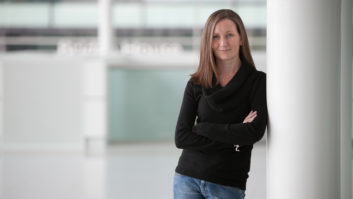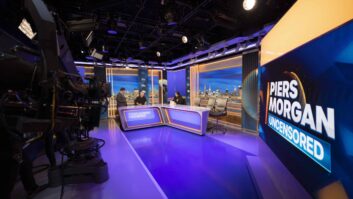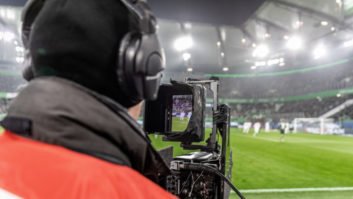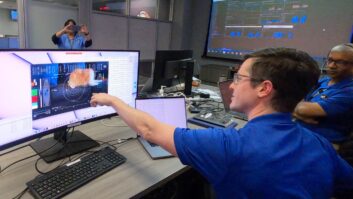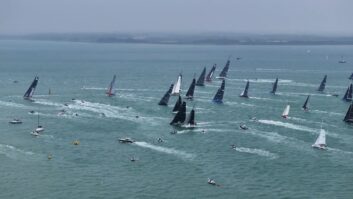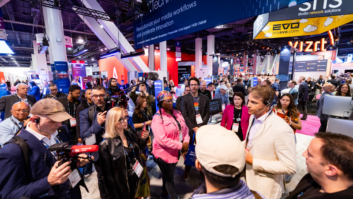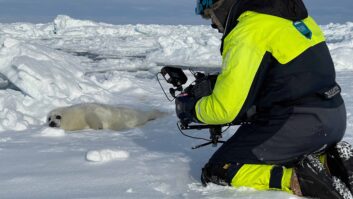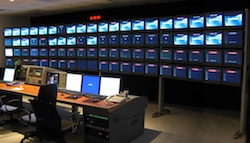
While every manufacturer who appears in the pages of TVBEurope counts broadcasters as customers, few have themselves ever featured in a television programme. For at least one vendor, a BBC programme proved a turning point in the company’s history. Dick Hobbs tells the story.
David Lees was a trained engineer, with a career designing specialised equipment for the film industry. He decided to set out on his own and, on 1 January 2001 formed Mode-Al, a shortened version of “modern aluminium”, a brief description of what he set out to do – build things in modern style from modular aluminium components. Despite saying of the brand “do not get drunk then think of company names” his business rapidly grew, largely in bespoke furniture.
Former contacts at places like Shepperton Studios were used to calling Lees with “can you make…” questions. As plasma screens emerged onto the market, these calls were increasingly about stands to mount them. From single screens, the natural extension was for multiple displays to replace monitor stacks.
“I was in the right place at the right time,” he explained, modestly. “At first people were amazed that we could mount the screen. Then they realised that it gave them the freedom to do what they want.
“In fact what we were doing is very, very technical,” he added. “It does not sound like it, but it is. The different sizes of screen people want to mount together is the challenge. The weight quickly mounts up too – a load of seven tonnes is not uncommon, with all those screens creating 15kW of heat.”
A Mode-Al screen array is almost always a customised solution, not least because of managing that heat. Often getting the stack close to a wall creates a laminar flow that helps move the heat away. Cable management for multiple screens is important, too, and many applications require motorised, movable arrays. Close contact between Mode-Al and the end user is critical.
A couple of years ago, he took stock of the business and realised he had reached the limit of what a one-man company could achieve. “I’m an indentured engineer – I needed to add business skills,” David recalled. “I realised I needed active investment, so I set out to find it.”
Which is where the story takes a slightly unusual turn. Dragons’ Den is a BBC television programme in which entrepreneurs are given the chance to pitch their ideas to a panel of real investors who, if they are impressed, put their own money into the business. Being primetime television it is, of course, set up for drama: contestants have just a couple of minutes to give the elevator pitch in front of the fearsome panel – the ‘dragons’ – who make snap decisions on whether they are in or out.
It seemed like a worthwhile opportunity to David Lees, so he filled in the forms. “I was fast-tracked into the programme,” he said. “I applied on Sunday, got a call from the production office on Monday, an interview later that week, and was recording my pitch two weeks after that.”
As Mode-Al was already a thriving business with a good revenue stream, it proved attractive to the investors, and two – Duncan Bannatyne and Theo Paphitis – stepped up with the investment Lees was looking for. But that was not the end of the story.
“It turned out that appearing on Dragons’ Den was the best free advertisement I could ever hope to have,” he said. “Me being on the programme set off a bidding war between two banks who wanted to lend me the money. In the end, my accountant said that the bank would be a better bet for me.
“We all learnt a lesson from it,” he concluded. “I learnt that if you present your case properly you will succeed, and the producers of the programme learnt that the dragons can drive too hard a bargain.”
The investment allowed Lees the time to look around for the right partner, who is now on board, acting as managing director and controlling the company, while he continues to drive the engineering and product development. It also gives him the time to have conversations with his customers that lead to what could be a very big new idea indeed.
Knowing of his ingenuity, a group of three big UK equipment rental companies explained a problem and asked him for a solution. “Flyaways and temporary installations were frustrating for them because of the time needed to build them,” he explained. “They told me that building the MCR on site for a big event like Wimbledon takes four days just to assemble the racks. They wanted to be able to do it faster.”
The solution was SpeedRack, a new approach to mounting equipment in standard 19” racks without changing the fundamental principles, including fixing centres. It achieves the goal of making rack assembly more flexible, so directors and engineers can change equipment layouts without grief.
It took a year to design and prototype SpeedRack, but a finalised design was ready for IBC last year. By NAB this April the system was finished, in production and patented. The Mode-Al booth was busy, but initial interest came from an unusual party.
“We got a lot of interest from the US military,” David said. “It looks like that is where the initial wins will be, so that – and NATO and UK military – is where our first push will go. That business will fund the push into broadcast.”
Not that the originators of the idea, and their competitors in OBs and flyaways, have been slow to pick up on SpeedRack: “We have shipped about six tonnes of kit to the World Cup,” he said. Given that much of it is aluminium and lightweight composite components, that is a lot of equipment.
“SpeedRack cost a lot to develop, for a business our size,” David said. “It was a small project when we started out, but we were fundamentally changing the way that people worked, so we had to come up with a complete, finished system. We had to make the investment to get the complete standard set out from day one.”
With the original business in aluminium constructions still thriving – Mode-Al does a nice line in edit desks complete with chairs in the same extrusions – and SpeedRack now coming online as a deliverable product, the company has changed dramatically in the last couple of years.
While BBC’s Dragons’ Den, in the end, did not provide funding, it was the trigger for a dramatic change from one man band to something much bigger. “I realised I did not want to be a lifestyle business,” David Lees concludes. “Now I have shareholders and a managing director who wants to take the business in new directions.”
